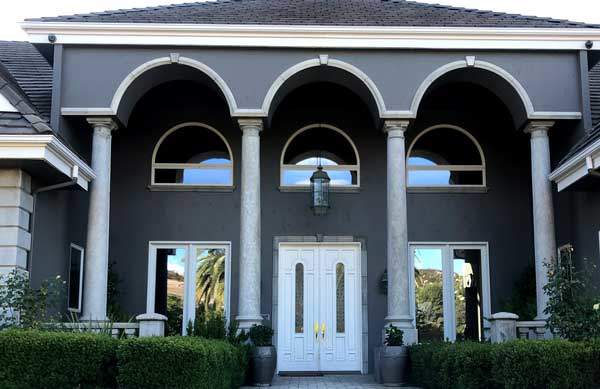Top Advantages of Installing Residential Window Tint for Your Residential or commercial property
Exactly How Residential Window Tinting Enhances Your Home's Energy Effectiveness
Residential window tinting offers an engaging solution for homeowners seeking to enhance energy efficiency within their living spaces. By applying specialized films to windows, it effectively reduces warm transfer, thus stabilizing indoor temperatures and lessening the demand for excessive heating or air conditioning. This not only cuts energy consumption however additionally provides an extra comfortable atmosphere by reducing glow. Comprehending the nuances of exactly how tinting works and picking the proper type for your home can be pivotal. Strangely enough, what factors should one take into consideration prior to making this investment?
Comprehending Window Tinting
Comprehending window tinting is necessary for property owners seeking to boost both convenience and energy efficiency in their home. Residential Window Tint. Home window tinting involves the application of a slim film to the inside or outside surface of glass windows. This film can substantially modulate the quantity of sunlight and warmth that goes into a home, thus affecting interior environment problems
There are different types of window tinting films available, each with distinctive buildings. The effectiveness of home window tinting is often measured by its Visible Light Transmission (VLT) percent, which shows how much light can pass with the film.
Advantages of Energy Effectiveness
Home window tinting not just enhances appearances yet also plays a substantial role in enhancing energy efficiency within domestic rooms. By lowering warmth transfer with windows, tinted films create an extra steady indoor environment, which can cause substantial reductions in power consumption for heating & cooling. This energy performance converts into reduced utility expenses, offering home owners with significant long-lasting financial savings.

Furthermore, window tinting boosts the convenience of living spaces. By lessening glare and obstructing damaging UV rays, tinted home windows produce an even more positive atmosphere, which can result in enhanced well-being for occupants. The security versus UV rays likewise assists protect furniture and floor covering from fading, adding to the long life of household items.
Exactly How Tinting Works
Tinting movies operate with a mix of sophisticated products and modern technologies created to control the quantity of solar power getting in a home. Mainly composed of polyester, these films commonly include ceramic or metal fragments that mirror and take in warmth. This double capability enables them to significantly minimize the penetration of ultraviolet (UV) rays and infrared radiation while allowing noticeable light to pass through.
The efficiency of window tinting is measured by its solar warm gain coefficient (SHGC), which indicates just how much solar power is sent through the home window. Lower SHGC worths are better as they denote greater warmth denial. Furthermore, home window tints can include a range of shades, allowing homeowners to customize their visual preferences while enhancing power efficiency.
Moreover, these films act as a browse this site barrier, stopping warm loss throughout cooler months by mirroring indoor warmth back into the home. This thermal insulation effect complements the cooling benefits acquired during warmer months, adding to a balanced interior climate year-round. By taking care of solar power effectively, residential window tinting not just enhances comfort however also plays an important role in lowering power intake and decreasing utility bills.
Selecting the Right Color

There are numerous types of home window films readily available, consisting of dyed, metalized, and ceramic. Ceramic films supply excellent heat control without endangering presence and are highly resilient, making them a prominent selection.
Visible light transmission (VLT) is an additional important aspect, as it shows the quantity of natural light that can travel through the colored glass. Homeowners should pick a color with a VLT that matches their lighting choices while still supplying ample glare reduction.
Furthermore, evaluating the solar heat gain coefficient (SHGC) can aid establish just how well a tint can block heat from sunlight. A reduced SHGC suggests far better warm control, inevitably enhancing power effectiveness.
Installment and Upkeep Tips
Appropriate setup and maintenance are vital parts in making the most of the advantages of property window tinting. To achieve ideal outcomes, it is suggested to work with more tips here a certified professional for installment. This makes sure that the tint is applied properly, avoiding air bubbles, creases, or misalignment that might compromise efficiency. Professionals also use specialized strategies and tools, which can improve the toughness and efficiency of the tint.
Complying with installation, upkeep is vital to extend the life of the window movie. It is advised to wait at least 30 days prior to cleaning the colored windows to permit the adhesive to heal totally.
In addition, routine assessments are useful. Examine more information for any type of peeling or bubbling, which could suggest inappropriate installation or use with time - Residential Window Tint. Dealing with these concerns without delay can stop more damage and maintain energy performance. By sticking to these setup and upkeep suggestions, property owners can ensure their home window tinting remains to provide substantial power savings and comfort for many years to find.
Verdict
To conclude, household window tinting works as an effective remedy for improving power performance within homes. By minimizing warm transfer and blocking damaging UV rays, home window films add to decrease energy usage and enhanced interior comfort. The option of proper tinting products, along with proper setup and upkeep, further makes best use of these benefits. Inevitably, window tinting represents a lasting financial investment that not just decreases utility expenses yet additionally promotes a comfy living setting throughout the year.
Home window tinting includes the application of a slim film to the interior or exterior surface of glass home windows. By minimizing heat transfer through home windows, tinted movies develop a much more secure interior climate, which can lead to significant reductions in energy usage for home heating and cooling.The efficiency of window tinting is measured by its solar warm gain coefficient (SHGC), which shows how much solar power is transmitted via the window. By handling solar energy properly, household home window tinting not only enhances convenience but likewise plays an essential function in reducing power usage and lowering utility costs.
By decreasing warmth transfer and obstructing hazardous UV rays, window films contribute to reduce energy usage and boosted indoor comfort.